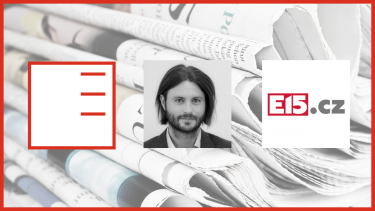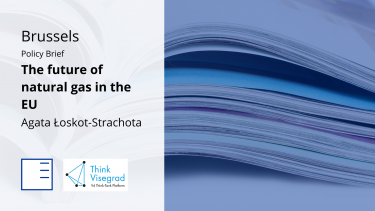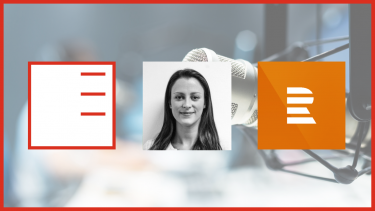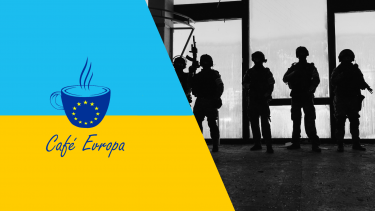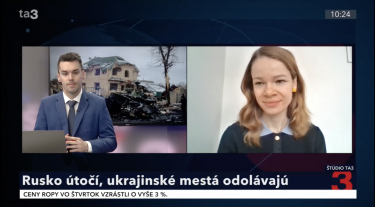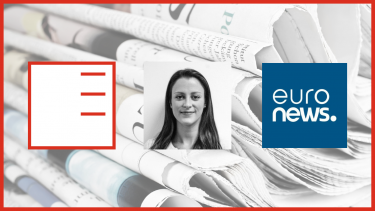E15.cz: Five scenarios of how the war in Ukraine will end. Russia's internal stability will decide, experts say
Christian Kvorning Lassen, Deputy Director and Head of Research at our Institute, together with other experts, spoke to the online news server E15.cz and described possible scenarios of how the war in Ukraine could end. The article thus describes five possible scenarios - both the more optimistic ones for Ukraine and the less favourable ones.
Show morePolicy Brief: The future of natural gas in the EU
A Policy Brief on the future of natural gas in the European Union was produced during a study visit to the Brussels office of Think Visegrad. The author of the brief, Agata Łoskot-Strachota, focuses on the current market crisis, which has raised questions about the role of gas in the decarbonisation process, as well as the cost and security of supply, and highlights the need for a common gas strategy that is in line with the objectives of the Green Deal, but also responds to short-term challenges.
Show more PDFINFO.cz: Ukraine, Georgia and Moldova are claiming their place in the European Union. Will there be an Eastern Enlargement 2.0?
The European Union's enlargement policy experienced a shock at the end of February when Russia-attacked Ukraine applied for EU membership. In the following days, Georgia and Moldova - other Eastern European countries with European aspirations and under imminent threat from Moscow - did the same without hesitation. Ukraine's application in particular was met with a very positive reaction from the EU. Our researcher Jana Juzová writes for INFO.cz.
Show moreThink Visegrad Fellowship offer: Call for proposals 2022
The Think Visegrad platform, which brings together think tanks from the Visegrad countries, including the EUROPEUM Institute for European Policy, is offering 8 visiting fellowships to non-Visegrad expert fellows for the period Autumn/Winter of 2022. The duration of fellowships varies from 6 to 8 weeks (based on agreement with the hosting institute).
Show more PDFDeník N: The Green Deal is more important than ever, says the Decarbonising Automotive Transport conference
Our researcher Michal Hrubý attended the conference on Decarbonisation of Automotive Transport where he took part in the debate. We are on the threshold of a decision about the future of Czech car transport. Demand for electromobility is growing exponentially globally, as is the development of battery technology. In the future, these could become value-added products that will kick-start our economy and return the Czech Republic to a leading position in the investment environment. According to representatives of the European Parliament, the state administration, the automotive industry and independent experts on electromobility, it is now important for the Czech Republic to leave the scepticism of change behind and start educating and preparing for the decarbonisation of automotive transport. Not only for the environmental impact, but especially for the future competitiveness of the sector. This was stated in a debate at the Decarbonisation of Automotive Transport conference organised by EUROPEUM Institute for European Policy on Tuesday 1 March.
Show more
ČRo Plus: Ukraine applies to join the European Union. Is its membership just wishful thinking or is it actually on the agenda?
Our researcher Jana Juzová spoke on Český Rozhlas Plus about Ukraine's application to the European Union, which was submitted last week. Ukrainian President Volodymyr Zelensky submitted the application, which was subsequently supported by European Commission President Ursula von der Leyen and the entire eastern wing of the Union. Is Ukraine's starting position problematic? How likely is it that candidate status will be granted? And which members are traditionally against the enlargement of the Union?
Show moreINVITATION: Café Evropa online: Russian aggression in Ukraine - can we stop Putin?
We would like to invite you to the next debate within the Café Evropa series, this time on the topic: " Café Evropa: Russian aggression in Ukraine - can we stop Putin?". The debate will take place on 2 March at 17:30. What will be the impact of the joint actions of the EU and NATO countries on Russia? Are the arms supplies sufficient or should direct military support be included? Can economic sanctions help Ukraine in any way now, or is this more of a step that will only become apparent in the longer term? Is the collapse of the rouble and the entire Russian market realistic? How can China influence Russia's current economic situation? And how will these sanctions be felt by the Russian population?
Show moreEURACTIV: You're either with us or against us. Serbia is gambling with its future in the EU
Our researcher Jana Juzová commented for Euractiv on how Serbia's ambiguous position is affecting its EU accession process. Serbia is one of the few European countries, that has refused to join the anti-Russian sanctions, even though it has supported Ukraine's territorial integrity and promised to help refugees. The role taken by this Western Balkan country is not surprising, as it has been teetering between the EU and Russia for the last decade. In the accession process, according to our researcher, Serbia's current position towards Russia is not the biggest problem, as Serbia also faces other shortcomings for EU integration.
Show moreTA3: Ukraine demands guarantees, wants to be in the EU
Our Associate Research Fellow Zuzana Stuchlíková spoke in the TA3 about the possible impact of Ukraine's accession to the European Union, what are the real chances of accession and what view other member states have on it.
Show more
EURONEWS: Ukraine is pushing for EU membership. But what are the real chances?
Our Researcher Jana Juzová commented Ukraine and its prospects for EU membership in the article for Euronews. Zelensky has in fact signed an official application for EU membership, a step that any European state can initiate on its own. Zelensky has raised the stakes and asked for a faster procedure so that his country can join the Union as soon as possible.
Show moreStaroměstské náměstí 4/1
Prague 1 - Staré Město
110 00
tel.: +420 212 246 552
email: europeum@europeum.org
https://www.europeum.org
